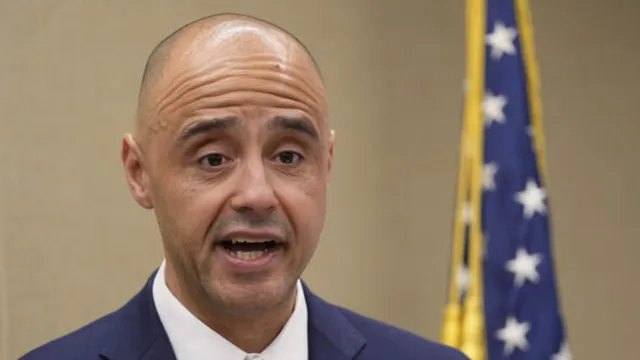
Top prosecutor confirms overwhelming evidence against Capitol rioters
2025-01-15 04:51- Matthew Graves oversaw the largest investigation in Justice Department history regarding Capitol riot prosecutions.
- Over 1,500 individuals were charged, with nearly 1,300 pleading guilty or being convicted.
- Graves concluded that pardons cannot erase the established record and accountability related to the January 6th events.
Express your sentiment!
Insights
In the United States, the aftermath of the Capitol riot on January 6, 2021, has led to significant legal repercussions for those involved. The top federal prosecutor for Washington, D.C., Matthew Graves, has overseen the largest investigation in the history of the Justice Department, dealing with the prosecution of hundreds of individuals involved in the riots. With more than 1,500 people charged with Capitol riot-related crimes, nearly 1,300 have either pleaded guilty or been convicted following trial proceedings. Graves emphasized that extensive evidence exists in nearly every case, making this incident one of the most thoroughly documented criminal events in U.S. history. In total, over 1,000 defendants have been sentenced, with approximately two-thirds receiving prison terms that vary significantly in length, from several days to 22 years. Graves recently announced his decision to step down from his position just ahead of Donald Trump's impending inauguration. Trump has expressed intentions to pardon individuals convicted in connection with the Capitol riot, which Graves pointed out could not erase the public record established through the legal processes surrounding the event. He described the investigatory record as significant, noting that there are always facts to be uncovered regarding the occurrences of January 6th. He mentioned that the accountability achieved through these prosecutions remains unaltered by potential pardons. Throughout the investigation, more than 100 police officers were reported injured while attempting to protect the Capitol from the rioters. The aggressive response to the riots has resulted in significant scrutiny of those involved, as well as the actions taken by prosecutors like Graves. He has faced substantial backlash and threats from supporters of Trump during his tenure, yet he has maintained that the prosecutors acted without political bias or interference, affirming that their duty was to enforce the law. Graves indicated his plans to transition out of the U.S. Attorney’s office while looking forward to a temporary vacation before eventually returning to the legal practice. As this political climate continues to evolve following the events of January 6th, the importance of the recorded evidence and the legal repercussions faced by those charged will remain pivotal elements in understanding the full scope of the Capitol riots in American history. Graves highlighted the sheer amount of evidence collected during the investigations and the systemic accountability imposed as being integral to the historical record surrounding these incidents.
Contexts
The events of January 6, 2021, marked a significant moment in American history, as supporters of then-President Donald Trump stormed the United States Capitol in a bold attempt to overturn the results of the 2020 presidential election. That day, a large gathering of Trump's supporters, many fueled by false claims of election fraud, converged on Washington, D.C., for a rally that was intended to coincide with the certification of the Electoral College votes by Congress. The atmosphere was charged, as speakers at the rally encouraged the crowd to march towards the Capitol, where lawmakers were in session to finalize the election results that confirmed Joe Biden's victory. This rally morphed into a violent insurrection as rioters breached the Capitol, leading to significant destruction and chaos within the halls of government. As rioters clashed with law enforcement, the situation escalated quickly. Several waves of demonstrators were able to penetrate the Capitol building, vandalizing offices, stealing property, and threatening the safety of lawmakers and staff. The breach of the Capitol was not just a physical intrusion; it represented a direct challenge to the core democratic processes of the United States. Lawmakers were evacuated or sheltered in place, and for several hours, there was a complete lockdown of the Capitol. This unprecedented attack drew international condemnation and raised urgent questions about the security measures in place to protect federal buildings and representatives. The aftermath of the Capitol riot led to extensive investigations, arrests, and a national dialogue on the implications of political rhetoric and the fragility of democratic institutions. More than a thousand individuals were charged with various offenses, ranging from trespassing to assaulting law enforcement officers. Additionally, the events prompted a second impeachment of Donald Trump, who was accused of inciting the violence through his inflammatory speeches and actions both before and during the riot. This also resulted in a broader discussion regarding the role of social media platforms in spreading disinformation and the responsibilities of leaders to ensure stability and peace. The January 6 Capitol riot has had profound implications for American society, politics, and security. It has heightened awareness of domestic extremism and the potential risks posed by political polarization. Legislative efforts have been initiated to enhance security protocols for the Capitol and to address the underlying social and political fractures that were exposed by the events of that day. As the country continues to grapple with the ramifications of the insurrection, the lessons learned from this critical event serve as a reminder of the importance of safeguarding democratic values and maintaining the rule of law.